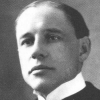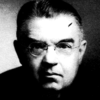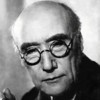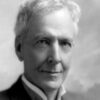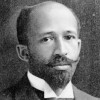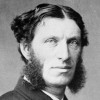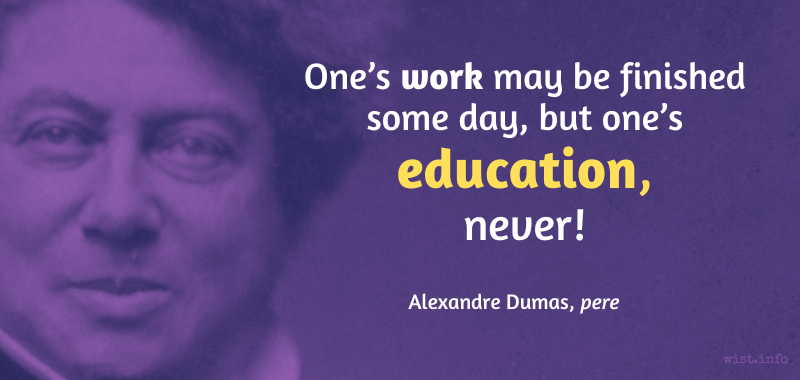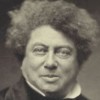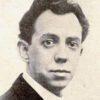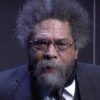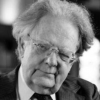Training is everything. The peach was once a bitter almond; cauliflower is nothing but cabbage with a college education.
Mark Twain (1835-1910) American writer [pseud. of Samuel Clemens]
Pudd’nhead Wilson, ch. 5, Epigraph (1894)
(Source)
Quotations about:
education
Note not all quotations have been tagged, so Search may find additional quotes on this topic.
If we turn away from knowledge and truth, we will not succeed. If we believe the worst and suspect the best, we alone will suffer. If we deny our progress, if we are against all of it, if we tear down our accomplishments, we will fill the world with sorrow, and we will blemish our own name with shame.
But if we are courageous and farsighted and farseeing, if we have no fear of the truth, if we seek only after light, then we and our children and our children’s children shall know the greatness of this wonderful, beautiful land we call America.Lyndon B. Johnson (1908-1973) American politician, educator, US President (1963-69)
Speech (1964-09-28), Convocation, Brown University
(Source)
On government support of higher education, research, and scholarship.
The object of education for that mind should be the teaching itself how to react with vigor and economy. No doubt the world at large will always lag so far behind the active mind as to make a soft cushion of inertia to drop upon, as it did for Henry Adams; but education should try to lessen the obstacles, diminish the friction, invigorate the energy, and should train minds to react, not at haphazard, but by choice, on the lines of force that attract their world. What one knows is, in youth, of little moment; they know enough who know how to learn.
Henry Adams (1838-1918) American journalist, historian, academic, novelist
The Education of Henry Adams, ch. 21 (1907)
(Source)
Education is that which remains, if one has forgotten everything else he learned in school.
Albert Einstein (1879-1955) German-American physicist
(Misattributed)
(Source)
Einstein cites this (as he agrees with it) as coming from a "wit" in a speech (1936-10-15), Convocation of University of New York, Albany [tr. Arronet]. Collected in "On Education" (1936), Out of My Later Years, ch. 9 (1950).
A good education is not so much one which prepares a man to succeed in the world, as one which enables him to sustain a failure.
Bernard Iddings Bell (1886-1958) American author, Episcopal priest, chaplain, academic, lecturer
“Know How vs. Know Why,” Life Magazine (1950-10-16)
(Source)
The central task of education is to implant a will and facility for learning; it should produce not learned but learning people. The truly human society is a learning society, where grandparents, parents, and children are students together.
Eric Hoffer (1902-1983) American writer, philosopher, longshoreman
Reflections on the Human Condition, ch. 1, # 32 (1973)
(Source)
Elitism is repulsive when based upon external and artificial limitations like race, gender, or social class. Repulsive and utterly false — for that spark of genius is randomly distributed across all cruel barriers of our social prejudice. We therefore must grant access — and encouragement — to everyone; and must be increasingly vigilant, and tirelessly attentive, in providing such opportunities to all children. We will have no justice until this kind of equality can be attained. But if only a small minority respond, and these are our best and brightest of all races, classes, and genders, shall we deny them the pinnacle of their soul’s striving because all their colleagues prefer passivity and flashing lights? Let them lift their eyes to hills of books, and at least a few museums that display the full magic of nature’s variety. What is wrong with this truly democratic form of elitism?
Stephen Jay Gould (1941-2002) American paleontologist, geologist, biologist
Dinosaur in a Haystack: Reflections in Natural History, Part 5, ch. 18 “Cabinet Museums: Alive, Alive, O!” (1995)
(Source)
Only if a child feels right can he think right.
Haim Ginott (1922-1973) Israeli-American school teacher, child psychologist, psychotherapist [b. Haim Ginzburg]
Teacher and Child, ch. 4 “Congruent Communication” (1972)
(Source)
Teachers are expected to reach unattainable goals with inadequate tools. The miracle is that at times they accomplish this impossible task.
Haim Ginott (1922-1973) Israeli-American school teacher, child psychologist, psychotherapist [b. Haim Ginzburg]
Teacher and Child, Preface (1972)
(Source)
Most often people seek in life occasions for persisting in their opinions rather than for educating themselves.
André Gide (1869-1951) French author, Nobel laureate
“An Unprejudiced Mind,” sec. 1, Pretexts (1959) [ed. O’Brien (1964)]
(Source)
Every child should have mud pies, grasshoppers, water-bugs, tadpoles, frogs, mud-turtles, elderberries, wild strawberries, acorns, chestnuts, trees to climb, brooks to wade in, water-lilies, woodchucks, bats, bees, butterflies, various animals to pet, hay-fields, pine-cones, rocks to roll, sand, snakes, huckleberries and hornets and any child who has been deprived of these has been deprived of the best part of his education.
Luther Burbank (1849-1926) American horticulturist
The Training of the Human Plant, ch. 10 “Character” (1907)
(Source)
The Whole People must take upon themselvs the Education of the Whole People and must be willing to bear the expences of it. There should not be a district of one Mile Square without a school in it, not founded by a Charitable individual but maintained at the expence of the People themselvs.
John Adams (1735-1826) American lawyer, Founding Father, statesman, US President (1797-1801)
Letter to John Jebb (1785-09-10)
(Source)
I must study Politicks and War that my sons may have liberty to study Mathematicks and Philosophy. My sons ought to study Mathematicks and Philosophy, Geography, natural History, Naval Architecture, navigation, Commerce and Agriculture, in order to give their Children a right to study Painting, Poetry, Musick, Architecture, Statuary, Tapestry and Porcelaine.
John Adams (1735-1826) American lawyer, Founding Father, statesman, US President (1797-1801)
Letter to Abigail Adams (1780-05-12 to 15)
(Source)
Education makes a greater difference between man and man, than nature has made between man and brute. The virtues and powers to which men may be trained, by early education and constant discipline, are truly sublime and astonishing. Newton and Locke are examples of the deep sagacity which may be acquired by long habits of thinking and study.
John Adams (1735-1826) American lawyer, Founding Father, statesman, US President (1797-1801)
Letter to Abigail Adams (1775-10-29)
(Source)
Nothing in education is so astonishing as the amount of ignorance it accumulates in the form of inert facts.
Henry Adams (1838-1918) American journalist, historian, academic, novelist
The Education of Henry Adams, ch. 25 (1907)
(Source)
Liberty trains for liberty. Responsibility is the first step in responsibility.
W. E. B. Du Bois (1868-1963) American writer, historian, social reformer [William Edward Burghardt Du Bois]
John Brown, ch. 13 “The Legacy of John Brown” (1909)
(Source)
On the policy among white colonial powers that non-whites "ought to be under the restraint and benevolent tutelage of stronger and wiser nations for their own benefit," until they are "capable" of being free.
For rigorous teachers seized my youth,
And purged its faith, and trimm’d its fire,
Show’d me the high white star of Truth,
There bade me gaze, and there aspire;
Even now their whispers pierce the gloom:
What doest thou in this living tomb?Matthew Arnold (1822-1888) English poet and critic
“Stanzas from the Grande Chartreuse,” st. 12, Fraser’s Magazine (1855-04)
(Source)
On his tour of a seventeenth-century monastery in Grenoble, in the French Alps, the headquarters of the Carthusian order of Catholic monks .
Thou art an heyre to fayre lyving, that is nothing, if thou be disherited of learning, for better were it to thee to inherite righteousnesse then riches, and far more seemely were it for thee to have thy Studie full of bookes, then thy pursse full of mony: to get goods is the benefit of Fortune, to keepe them the gift of Wisedome.
[Thou art an heir to fair living; that is nothing if thou be disinherited of learning, for better were it to thee to inherit righteousness than riches and far more seemly were it for thee to have thy study full of books than thy purse full of money. To get goods is the benefit of fortune, to keep them the gift of wisdom. (1916 ed.)]John Lyly (c. 1553-1606) was an English writer [also Lilly or Lylie]
Euphues: The Anatomy of Wit, “Letter to Alcius” (1579)
(Source)
We’ve tried ignorance for a thousand years. It’s time we try education.
Joycelyn Elders (b. 1933) American pediatrician, public health administrator, academic
Penn & Teller: Bullshit!, s. 4, ep. 6 “Abstinence” (2006-06-05)
(Source)
On sex education for kids.
Whence had you this illustrious name?
From virtue and unblemish’d fame.
By birth the name alone descends;
Your honour on yourself depends:
Think not your coronet can hide
Assuming ignorance and pride.
Learning by study must be won,
‘Twas ne’er entail’d from son to son.John Gay (1685-1732) English poet and playwright
“The Pack-Horse and Carrier (To a young Nobleman),” ll. 41-42
(Source)
Some printings of the poem leave off the prologue, of which this is a part.
Real education precisely consists in the fact that we see beyond the symbols and the mere machinery of the age in which we find ourselves: education precisely consists in the realization of a permanent simplicity that abides behind all civilizations, the life that is more than meat, the body that is more than raiment. The only object of education is to make us ignore mere schemes of education. Without education, we are in a horrible and deadly danger of taking educated people seriously.
Gilbert Keith Chesterton (1874-1936) English journalist and writer
“Our Note Book,” The Illustrated London News (1905-12-02)
(Source)
Historians may be dogmatists, I know, though not so often now as when history was dogma. At least you will perhaps agree that even a smattering of history and especially of letters will go far to dull the edges of uncompromising conviction. No doubt one may quote history to support any cause, as the devil quotes scripture; but modern history is not a very satisfactory side-arm in political polemics; it grows less and less so.
Learned Hand (1872-1961) American jurist
“Sources of Tolerance,” speech, University of Pennsylvania Law School (1930-06)
(Source)
Collected in The Spirit of Liberty (1953).
I don’t think there is anything I have done that I wish I hadn’t done. Because I learn from everything I do. I’m in school every day. My diploma will be my tombstone.
Eartha Kitt (1927-2008) American singer and actress
In Lon Tuck, “It’s Been a Long Time But … Eartha’s Back!” Washington Post (1978-01-19)
(Source)
When a citation is given to this quotation, it's usually "Playbill 1978." It does indeed show up in an (unknown month) of Playbill Magazine in 1978, also in association with her starring role in the stage show Timbuktu, which opened on Broadway March 1st of that year, but this article appears to be the source. (see comments for the helpful tip).
One’s work may be finished some day, but one’s education, never!
[L’oeuvre est terminée un jour; l’éducation jamais!]
Alexandre Dumas, père (1802-1870) French novelist and dramatist
My Memoirs [Mes Mémoires], ch. 113 (1852-1856) [tr. Waller (1907); 1826-1830: Vol. 3, Book 2, ch. 10]
(Source)
I am still learning.
[Ancora imparo.]
Michelangelo (1475-1564) Italian artist, architect, poet [Michelangelo di Lodovico Buonarroti Simoni]
(Attributed)
Also rendered Anchora imparo. This is often described as a daily mantra of Michelangelo's. This association can be traced to Richard Duppa, The Lives and Works of Michael Angelo and Raphael (1806) [tr. Hazlitt]. Duppa misattributed to Michelangelo a drawing by Domenico Giuntalodi, which included the saying. The phrase itself was popular during the 16th Century.
While there's no indication that Michelangelo did not say this, or agree with the sentiment, it does not seem to have been solidly cited to him, or shown to be a personal motto, let alone being original to him.
More discussion: Michelangelo - Wikiquote.
That there should one Man die ignorant who had capacity for Knowledge, this I call a tragedy.
Thomas Carlyle (1795-1881) Scottish essayist and historian
Sartor Resartus, Book 3, ch. 4 (1831)
(Source)
Education is the sum of what students teach each other in between lectures and seminars. You sit in each other’s rooms and drink coffee — I suppose it would be vodka and Red Bull now — you share enthusiasms, you talk a lot of wank about politics, religion, art and the cosmos and then you go to bed, alone or together according to taste. I mean, how else do you learn anything, how else do you take your mind for a walk?
Stephen Fry (b. 1957) British actor, writer, comedian
The Fry Chronicles: An Autobiography, Part 1 “College to Colleague” (2012)
(Source)
What had men thought? What had men believed? How did they come by those thoughts and beliefs? How had men learned to govern themselves? Were the processes the same everywhere?
Did man build cities because of an inner drive, like that of a beaver to build dams? How much of what we do is free will, and how much is programmed in our genes? Why is each people so narrow that it believes that it, and it alone, has all the answers? In religion, is there but one road to salvation? Or are there many, all equally good, all going in the same general direction?
I have read my books by many lights, hoarding their beauty, their wit or wisdom against the dark days when I would have no book, nor a place to read.
I have known hunger of the belly kind many times over, but I have known a worse hunger: the need to know and to learn.
Louis L'Amour (1908-1988) American writer
Education of a Wandering Man: A Memoir, ch. 11 (1989)
(Source)
Nothing reveals more clearly men’s attitude to learning and literature, and what use they think these are to the State, than the low price they put on them, and their opinion of those who have chosen to practice them.
[Rien ne découvre mieux dans quelle disposition sont les hommes à l’égard des sciences et des belles-lettres, et de quelle utilité ils les croient dans la république, que le prix qu’ils y ont mis, et l’idée qu’ils se forment de ceux qui ont pris le parti de les cultiver.]
Jean de La Bruyère (1645-1696) French essayist, moralist
The Characters [Les Caractères], ch. 12 “Of Opinions [Des Jugements],” § 17 (12.17) (1688) [tr. Stewart (1970)]
(Source)
(Source (French)). Alternate translations:
Nothing discovers better what disposition men have to Knowledge and Learning, and how profitable they are esteem'd to the Publick, than the price which is set on them, and the Idea they have formed of those who have taken the pains to improve them.
[Bullord ed. (1696)]
Nothing discovers better what regard Men have to Science and polite Learning, and how profitable they esteem them to the Publick, than the price they set on them, and the Idea they form to themselves of those who have taken the pains to cultivate them.
[Curll ed. (1713)]
Nothing better manifests the Regard paid to the Sciences and Literature, and Men's Sense of their Utility to the Public, than the Recompences assigned to them, and the Repute in which they stand who excel in them.
[Browne ed. (1752)]
Nothing better demonstrates how men regard science and literature, and of what use they are considered in the State, than the recompense assigned to them, and the idea generally entertained of those persons who resolve to cultivate them.
[tr. Van Laun (1885)]
With just enough of learning to misquote.
George Gordon, Lord Byron (1788-1824) English poet
“English Bards and Scotch Reviewers,” l. 66ff (1809)
(Source)
A real education takes place, not in the lecture hall or library, but in the rooms of friends, with earnest frolic and happy disputation. Wine can be a wiser teacher than ink, and banter is often better than books. That was my theory at least, and I was living by it.
Stephen Fry (b. 1957) British actor, writer, comedian
The Fry Chronicles: An Autobiography, Part 1 “College to Colleague” (2012)
(Source)
Reading those turgid philosophers here in these remote stone buildings may not get you a job, but if those books have forced you to ask yourself questions about what makes life truthful, purposeful, meaningful, and redeeming, you have the Swiss Army Knife of mental tools, and it’s going to come in handy all the time.
Bill Watterson (b. 1958) American cartoonist
Commencement Address, Kenyon College (1990-05-20)
(Source)
Liberal learning is both a safeguard against false ideas of freedom and a source of true ones.
Whitney Griswold (1906–1963) American historian, educator [Alfred Whitney Griswold]
“Freedom, Security, and the University Tradition,” speech, Columbia University Bicentennial (1954-06-02)
(Source)
Reprinted in Griswold, In the University Tradition (1957).
Quoted by John F. Kennedy in a speech at Yale University (1962-06-11). Citations of Kennedy for the quote are far more common than for Griswold's original.
Adept Kung said: “I do nothing to others that I wouldn’t want done to me.”
“That’s something you haven’t quite mastered, Kung,” the Master replied.
[子貢曰、我不欲人之加諸我也、吾亦欲無加諸人。
子曰、賜也、非爾所及也。]Confucius (c. 551- c. 479 BC) Chinese philosopher, sage, politician [孔夫子 (Kǒng Fūzǐ, K'ung Fu-tzu, K'ung Fu Tse), 孔子 (Kǒngzǐ, Chungni), 孔丘 (Kǒng Qiū, K'ung Ch'iu)]
The Analects [論語, 论语, Lúnyǔ], Book 5, verse 12 (5.12) (6th C. BC – AD 3rd C.) [tr. Hinton (1998)]
(Source)
The earliest appearance of the "Golden Rule" in world literature. See also 12.2, 15.24, and Matthew 7:12.
Originally numbered 5.11 by Legge and other early sources, as noted.
(Source (Chinese)). Alternate translations:
Tsze-kung said, "What I do not wish men to do to me, I also wish not to do to men."
The Master said, "Ts'ze, you have not attained to that."
[tr. Legge (1861), 5.11]
Tsz-kung made the remark: ‘That which I do not wish others to put upon me, I also wish not to put upon others.’
‘Nay,’ said the Master, 'you have not got so far as that.’
[tr. Jennings (1895), 5.11]
A disciple said to Confucius, "What I do not wish that others should not do unto me, I also do not wish that I should do unto them."
"My friend," answered Confucius, "You have not yet attained to that."
[tr. Ku Hung-Ming (1898), 5.11]
Tzŭ Kung said, "What I do not wish others to do to me, that also I wish not to do to them."
"Tzŭ!" observed the Master, "that is a point to which you have not attained."
[tr. Soothill (1910), 5.11]
Tze-Kung said: What I don't want done to me, 1 don’t want to do to anyone else.
Confucius said: No, Ts'ze. you haven't got that far yet.
[tr. Pound (1933), 5.11]
Tzu-kung said, What I do not want others to do to me, I have no desire to do to others.
The Master said, Oh Ssu! You have not quite got to that point yet.
[tr. Waley (1938), 5.11]
Tuan-mu Tz'u said, "What I do not wish others to do unto me I also wish not to do unto others."
"You're not up to that!"
[tr. Ware (1950)]
Tzu-kung said, "While I do not wish others to impose on me, I also wish not to impose on others."
The Master said, "Ssu, that is quite beyond you."
[tr. Lau (1979)]
Zigong said: "If I do not want others to inflict something on me, I also want to avoid inflicting it on others."
The Master said: "Si, this is not a point you have yet reached."
[tr. Dawson (1993)]
Zigong said: "I would not want to do to others what I do not want them to do to me."
The Master said: "Oh, you have not come that far yet!"
[tr. Leys (1997)]
Zi-gong said: "What I do not wish others to impose on me, I also do not wish to impose on others."
The Master said: "Ci, this is beyond your reach."
[tr. Huang (1997)]
Zigong said: "I do not want others to force anything on me, and I do not want to force anything on others, too."
Confucius said: "Si, it could not be reached by you."
[tr. Cai/Yu (1998), #104]
Dž-gùng said, If I do not wish others to do something to me, I wish not to do it to them.
The Master said, Sz', this is not what you can come up to.
[tr. Brooks/Brooks (1998)]>
Zigong said, "I do not want others to impose on me, nor do I want to impose on them."
Confucius replied, "Zigong, this is quite beyond your reach."
[tr. Ames/Rosemont (1998)]
Zigong said, “What I do not wish others to do unto me, I also wish not to do unto others.”
The Master said, “Ah, Zigong! That is something quite beyond you.”
[tr. Slingerland (2003)]
Zigong said, What I don’t want others to do to me, I want to avoid doing to others.
The Master said, Si (Zigong), you haven’t gotten to that stage yet.
[tr. Watson (2007)]
Zigong said, "I do not wish others to impose what is unreasonable [jia] on me, and I do also not wish to impose what is unreasonable on others."
The Master said, "Si [Zigong], this is not something that is within your power."
[tr. Chin (2014)]
Zi Gong said, "I hope other people will not impose on me against my will. Likewise, I will not impose on other people against their will too."
Confucius said, "Ci, you may not be able to do so all the time."
[tr. Li (2020)]
Questions about the reproductive system should be answered as naturally as ones about the railroad system.
Marcelene Cox (1900-1998) American writer, columnist, aphorist
“Ask Any Woman” column, Ladies’ Home Journal (1946-02)
(Source)
For a liberal arts education is not a tool like a hoe or a blueprint or an electric mixer. It is a true and precious stone which can glow just as wholesomely on a kitchen table as when it is put on exhibition in a jeweler’s window or bartered for bread and butter. Learning is a boon, a personal good. It is a light in the mind, a pleasure for the spirit, an object to be enjoyed. It is refreshment, warmth, illumination, a window from which we get a view of the world. To what barbarian plane are we descending when we demand that it serve only the economy?
Phyllis McGinley (1905-1978) American author, poet
“A Jewel in the Pocket,” Sixpence in Her Shoe (1964)
(Source)
Education is more than information, or skill, or propaganda. In each age education must take into account the conditions of that age. But the educated mind is not a mere creature of its own time. Education is emancipation from herd opinion, self-mastery, capacity for self-criticism, suspended judgment, and urbanity.
Everett Dean Martin (1880-1941) American educator, minister, writer, lecturer
The Meaning of a Liberal Education, Preface (1926)
(Source)
I remind young people everywhere I go, one of the worst things the older generation did was to tell them for twenty-five years “Be successful, be successful, be successful” as opposed to “Be great, be great, be great”. There’s a qualitative difference.
The mind is formed by the knowledge and the direction of ideas it receives and the guidance it is given. Great things alone can make a great mind, and petty things will make a petty mind unless a man rejects them as completely alien.
[Weil der menschliche Geist durch die ihm mitgetheilten Kenntnisse und Ideenrichtungen erzogen wild. Nor das Grosse kann ihn grostartig, das Kleine nur kleinlich machen, wenn er et nicht wie elwas ganz Fremdes ganz von sich stösst.]
Karl von Clausewitz (1780-1831) Prussian soldier, historian, military theorist
On War [Vom Kriege], Book 2, ch. 2 “On the Theory of War [Über die Theorie des Krieges],” § 40 (2.2.40) (1832) [tr. Howard & Paret (1976)]
(Source)
(Source (German)). Alternate translations:
The human mind is trained by the knowledge imparted to it, and the direction given to its ideas. Only what is great can make it great; the little can only make it little, if the mind itself does not reject it as something repugnant.
[tr. Graham (1873)]
The human mind is formed by the kinds of knowledge imparted to it and the direction given to its ideas. Only what is great can make it great; the little can only make it little, if the mind itself does not reject it as something repugnant to it.
[tr. Jolles (1943)]
Even when it comes to learning, the good student contradicts his teacher and makes him more eager to explain and defend the truth. Challenge someone discreetly and his teaching will be more perfect.
[Y aun para el aprender es treta del discípulo contradecir al maestro, que se empeña con más conato en la declaración y fundamento de la verdad; de suerte que la impugnación moderada da ocasión a la enseñanza cumplida.]
Baltasar Gracián y Morales (1601-1658) Spanish Jesuit priest, writer, philosopher
The Art of Worldly Wisdom [Oráculo Manual y Arte de Prudencia], § 213 (1647) [tr. Maurer (1992)]
(Source)
(Source (Spanish)). Alternate translations:
In matter of learning it is a cunning fetch in the Schollar to contradict his Master, inasmuch as it lays an obligation upon him, to labour to explain the truth with greater perspicuity and solidity.) So that moderate contradiction gives him that teaches occasion to teach thoroughly.
[Flesher ed. (1685)]
Also in learning it is a subtle plan of the pupil to contradict the master, who thereupon takes pains to explain the truth more thoroughly and with more force, so that a moderate contradiction produces complete instruction.
[tr. Jacobs (1892)]
A good trick on the party of the pupil is to bait his teacher, who thereby excites himself to greater effort in the declaration, and the foundations of this beliefs, whence it comes that well-moderated debate makes for most effective teaching.
[tr. Fischer (1937)]
Not to talk with people although they can be talked with is to waste people. To talk with people although they can’t be talked with is to waste words. A man of understanding does not waste people, but he also does not waste words.
[子曰、可與言、而不與之言、失人、不可與言、而與之言、失言、知者不失人、亦不失言。]
Confucius (c. 551- c. 479 BC) Chinese philosopher, sage, politician [孔夫子 (Kǒng Fūzǐ, K'ung Fu-tzu, K'ung Fu Tse), 孔子 (Kǒngzǐ, Chungni), 孔丘 (Kǒng Qiū, K'ung Ch'iu)]
The Analects [論語, 论语, Lúnyǔ], Book 15, verse 8 (15.8) (6th C. BC – 3rd C. AD) [tr. Dawson (1993)]
(Source)
(Source (Chinese)). Older translations use Legge's original verse divisions and numbering (15.7).
The passage contains a native pun, combining both noun and verb senses of yén [言] (talk), which is difficult to translate into English (leading to blends of "speak" and "talk" and "words"). Alternate translations:
When a man may be spoken with, not to speak to him is to err in reference to the man. When a man may not be spoken with, to speak to him is to err in reference to our words. The wise err neither in regard to their man nor to their words.
[tr. Legge (1861), 15.7]
Not to speak to a man to whom you ought to speak, is to lose your man; to speak to one to whom you ought not to speak is to lose your words. those who are wise will not lose their man, nor yet their words.
[tr. Jennings (1895), 15.7]
When you meet the proper person to speak to and do not speak out, you lose your opportunity; but when you meet one who is not a proper person to speak to and you speak to him, you waste your words. A man of intelligence never loses his opportunity, neither does he waste his words.
[tr. Ku Hung-Ming (1898), 15.7]
Not to enlighten one who can be enlightened is to waste a man; to enlighten one who cannot be enlightened is to waste words. The intelligent man neither wastes his man nor his words.
[tr. Soothill (1910), 15.7]
When you should talk to a man, and don’t, you lose the man; when it’s no use talking to a man, and you talk to him, you waste words. An intelligent man wastes (loses) neither men nor words.
[tr. Pound (1933), 15.7]
Not to talk to one who could be talked to, is to waste a man. To talk to those who cannot be talked to, is to waste one's words. He who is truly wise never wastes a man; but on the other hand, he never wastes his words.
[tr. Waley (1938), 15.7]
If we fail to speak with a man who can be spoken with, we lose a man. If we do speak with a man who cannot be spoken with, our words go for nought. The wise lose neither man nor words.
[tr. Ware (1950), 15.8]
When you find a person worthy to talk to and fail to talk to him, you have lost your man. When you find a man unworthy to talk to and you talk to him, you have lost (i.e., wasted) your words. A wise man neither loses his man, nor loses his words.
[tr. Lin Yutang (1938)]
To fail to speak to a man who is capable of benefiting is to let a man go to waste. To speak to a man who is incapable of benefiting is to let one's words go to waste. A wise man lets neither men nor words go to waste.
[tr. Lau (1979), 15.8]
When dealing with a man who is capable of understanding your teaching, if you do not teach him, you waste the man. When dealing with a man who is incapable of understanding your teaching, if you do teach him, you waste your teaching. A wise teacher wastes no man and wastes no teaching.
[tr. Leys (1997), 15.8]
If a man is worth talking to and you do not talk to him, you lose a man; if a man is not worth talking to and you talk to him, you lose your words. The man of wisdom neither loses a man nor loses his words.
[tr. Huang (1997), 15.8]
When you should talk with one, you do not talk with one, it means to lose the people. When you should not talk with one, you talk with one, it means to lose the word. A wise person does not lose the people, and does not lose the word too.
[tr. Cai/Yu (1998), 15.8 / #392]
To fail to speak to someone who can be engaged is to let that person go to waste; to speak to someone who cannot be engaged is to waste your words. The wise [zhi] do not let people go to waste, but they do not waste their words, either.
[tr. Ames/Rosemont (1998), 15.8]
If he can be talked to and you do not talk to him, you waste the man. If he cannot be talked to and you talk to him, you waste your talk. The knowledgeable will not waste a man, but will also not waste his talk.
[tr. Brooks/Brooks (1998), 15.8]
When a person is capable of understanding your words, and you refuse to speak, you're wasting a person. When a person isn't capable of understanding your words, and you speak anyway, you're wasting words. The wise waste neither words nor people.
[tr. Hinton (1998), 15.8]
If it's someone you ought to speak to and you fail to speak, you waste a person. If it's someone you ought not to speak to and you speak, you waste words. The wise man doesn't waste people and doesn't waste words, either.
[tr. Watson (2007), 15.8]
Not to speak to a man who is capable of absorbing what you say is to let the man go to waste. To speak to a man who is incapable of absorbing what you say is to let your words go to waste. A person of wisdom does not let either men or words go to waste.
[tr. Annping Chin (2014), 15.8]
When it is appropriate and feasible to speak [and give advice] to a person, but you refrain from doing so, you will lose a friend. When it is inappropriate or infeasible to speak to a person, but you speak anyhow, you misspeak.
[tr. Li (2020), 15.8]
No education is worth having that does not teach the lesson of concentration on a task, however unattractive. These lessons, if not learnt early, will be learnt, if at all, with pain and grief in later life.
Cyril Connolly (1903-1974) English intellectual, literary critic and writer.
Enemies of Promise, Part 3, ch. 24 “Vale” (1938)
(Source)
Speaking as a personified Eton College, quoting one of the masters there.
You imply our education is of no use to you in after life. But no education is. We are not an employment agency; all we can do is to give you a grounding in the art of mixing with your fellow men, to tell you what to expect from life and give you an outward manner and inward poise, an old prescription from the eighteenth century which we call a classical education, an education which confers the infrequent virtues of good sense and good taste and the benefit of dual nationality, English and Mediterranean, and which, taking into account the difficulties of modern life, we find the philosophy best able to overcome them.
Cyril Connolly (1903-1974) English intellectual, literary critic and writer.
Enemies of Promise, Part 3, ch. 24 “Vale” (1938)
(Source)
Speaking as a personified Eton College.
What happens when a state tries to purge its state universities or a community tries to purge its public schools of alleged subversives? […] What happens is the demoralization and eventual corruption of the school system. This is not a momentary or even temporary affair; it is something the consequences of which may be felt for years. The search for subversives results in the intimidation of the independent, the original, the imaginative, and the experimental-minded. It discourages independence of thought in teachers and students alike. It discourages the reading of books that may excite the suspicion of some investigator or some Legionnaire. It discourages the discussion of controversial matters in the classroom, for such discussion may be reported, or misreported, and cause trouble. It creates a situation where first-rate minds will not go into teaching or into administration and where students therefore get poor teaching. In the long run it will create a generation incapable of appreciating the difference between independence of thought and subservience. In the long run it will create a generation not only deprived of liberty but incapable of enjoying liberty.
Henry Steele Commager (1902-1998) American historian, writer, activist
“Free Enterprise in Ideas,” Freedom, Loyalty, Dissent (1954)
(Source)
Originally published in the Saturday Review (1952), based on a speech to the Advertising Council's American Round Table, New York City (1951).
For what greater or better service can we render to our country, than by thus educating and instructing the rising generation, especially in times like these, and in the present state of morality, when society has fallen into such disorders as to require everyone to use his best exertions to check and restrain it?
[Quod enim munus rei publicae afferre maius meliusve possumus, quam si docemus atque erudimus iuventutem, his praesertim moribus atque temporibus, quibus ita prolapsa est, ut omnium opibus refrenanda atque coercenda sit?]
Marcus Tullius Cicero (106-43 BC) Roman orator, statesman, philosopher
De Divinatione [On Divination], Book 2, ch. 2 (2.2) / sec. 4 (44 BC) [tr. Yonge (1853)]
(Source)
(Source (Latin)). Alternate translation:
For what greater or better service can I render to the common wealth than to instruct and train the youth -- especially in view of the fact that our young men have gone so far astray because of the present moral laxity that the utmost effort will be needed to hold them in check and direct them in the right way?
[tr. Falconer (1923)]
What nobler employment, or what more advantageous to the state, than that of the man who instructs the rising generation!
[Source (<1864)]
The chief aim of education is to show you, after you make a livelihood, how to enjoy living; and you can live longest and best and most rewardingly by attaining and preserving the happiness of learning.
Gilbert Highet (1906-1978) Scottish-American classicist, academic writer, intellectual critic, literary historian
The Immortal Profession: The Joys of Teaching and Learning (1976)
(Source)
It seems war stories aren’t very well received at this point. I’m told they’re outdated, untimely and as might be expected — make some unpleasant reading. And, as you have no doubt already perceived, human beings don’t like to remember unpleasant things. They gird themselves with the armor of wishful thinking, protect themselves with a shield of impenetrable optimism, and, with a few exceptions, seem to accomplish their “forgetting” quite admirably. But you, my children, I don’t want you to be among those who choose to forget. I want you to read my stories and a lot of others like them. I want you to fill your heads with Remarque and Tolstoy and Ernie Pyle. I want you to know what shrapnel, and “88’s” and mortar shells and mustard gas mean. I want you to feel, no matter how vicariously, a semblance of the feeling of a torn limb, a burnt patch of flesh, the crippling, numbing sensation of fear, the hopeless emptiness of fatigue. All these things are complementary to the province of War and they should be taught and demonstrated in classrooms along with the more heroic aspects of uniforms, and flags, and honor and patriotism.
Rod Serling (1924-1975) American screenwriter, playwright, television producer, narrator
“First Squad, First Platoon,” Dedication (c. 1947)
(Source)
Dedication to his unborn children, in one of his first (unpublished) works of fiction, while at Antioch College under the GI Bill. In Anne Serling, As I Knew Him: My Dad, Rod Serling (2013)
Live with those from whom you can learn, — let friendly intercourse be a school for knowledge, and social contact, a school for culture; to make teachers of your friends is to join the need of learning to the joy of converse.
[Tratar con quien se pueda aprender. Sea el amigable trato escuela de erudición, y la conversación enseñanza culta; un hacer de los amigos maestros, penetrando el útil del aprender con el gusto del conversar.]
Baltasar Gracián y Morales (1601-1658) Spanish Jesuit priest, writer, philosopher
The Art of Worldly Wisdom [Oráculo Manual y Arte de Prudencia], § 11 (1647) [tr. Fischer (1937)]
(Source)
(Source (Spanish)). Alternate translations:
Familiar Conversation ought to be the School of Learning and breeding. A man is to make his Masters of his Friends, seasoning the pleasure of conversing with the profit of instruction.
[Flesher ed. (1685)]
Let friendly intercourse be a school of knowledge, and culture be taught through conversation; thus you make your friends your teachers and mingle the pleasures of conversation with the advantages of instruction.
[tr. Jacobs (1892)]
Let friendly relations be a school of erudition, and conversation, refined teaching. Make your friends your teachers and blend the usefulness of learning with the pleasure of conversation.
[tr. Maurer (1992)]
For the fascist, schools and universities are there to indoctrinate national or racial pride, conveying for example (where nationalism is racialized) the glorious achievements of the dominant race.
Jason Stanley (b. 1969) American philosopher, epistemologist, academic
How Fascism Works: The Politics of Us and Them, ch. 4 (2018)
(Source)
In a word, our moral dispositions are formed as a result of the corresponding activities. Hence it is incumbent on us to control the character of our activities, since on the quality of these depends the quality of our dispositions. It is therefore not of small moment whether we are trained from childhood in one set of habits or another; on the contrary it is of very great, or rather of supreme, importance.
[καὶ ἑνὶ δὴ λόγῳ ἐκ τῶν ὁμοίων ἐνεργειῶν αἱ ἕξεις γίνονται. διὸ δεῖ τὰς ἐνεργείας ποιὰς ἀποδιδόναι: κατὰ γὰρ τὰς τούτων διαφορὰς ἀκολουθοῦσιν αἱ ἕξεις. οὐ μικρὸν οὖν διαφέρει τὸ οὕτως ἢ οὕτως εὐθὺς ἐκ νέων ἐθίζεσθαι, ἀλλὰ πάμπολυ, μᾶλλον δὲ τὸ πᾶν.]
Aristotle (384-322 BC) Greek philosopher
Nicomachean Ethics [Ἠθικὰ Νικομάχεια], Book 2, ch. 1 (2.1, 1103b.20ff) (c. 325 BC) [tr. Rackham (1934), sec. 7-8]
(Source)
(Source (Greek)). Alternate translations:
Or, in one word, the habits are produced from the acts of working like to them: and so what we have to do is to give a certain character to these particular acts, because the habits formed correspond to the differences of these. So then, whether we are accustomed this way or that straight from childhood, makes not a small but an important difference, or rather I would say it makes all the difference.
[tr. Chase (1847)]
And indeed, in a word, all habits are formed by acts of like nature to themselves. And hence it becomes our duty to see that our acts are of a right character. For, as our acts vary, our habits will follow in their course. It makes no little difference, then, to what kind of habituation we are subjected from our youth up; but it is, on the contrary, a matter that is important to us, or rather all-important.
[tr. Williams (1869), sec. 24]
In a word moral states are the results of activities corresponding to the moral states themselves. It is our duty therefore to give a certain character to the activities, as the moral states depend upon the differences of the activities. Accordingly, the difference between one training of the habits and another from early days is not a light matter, but is serious or rather all-important.
[tr. Welldon (1892)]
In a word, acts of any kind produce habits or characters of the same kind. Hence we ought to make sure that our acts be of a certain kind; for the resulting character varies as they vary. It makes no small difference, therefore, whether a man be trained from his youth up in this way or in that, but a great difference, or rather all the difference.
[tr. Peters (1893)]
Thus, in one word, states of character arise out of like activities. This is why the activities we exhibit must be of a certain kind; it is because the states of character correspond to the differences between these. It makes no small difference, then, whether we form habits of one kind or of another from our very youth; it makes a very great difference, or rather all the difference.
[tr. Ross (1908)]
In a word, then, states come about from activities that are similar to them. That is why the activities must exhibit a certain quality, since the states follow along in accord with the differences between these. So it makes no small difference whether people are habituated in one way or in another way straight from childhood; on the contrary, it makes a huge one -- or rather, all the difference.
[tr. Reeve (1948)]
In short, it is by similar activities that habits are developed in men; and in view of this, the activities in which men are engaged should be of [the right] quality, for the kinds of habits which develop follow the corresponding differences in these activities. So in acquiring habit it makes no small difference whether we are acting in one way or on the contrary way right from our early youth; it makes a great difference, or rather all the difference.
[tr. Apostle (1975)]
In a word, then, like activities produce like dispositions. Hence we must give our activities a certain quality, because it is their characteristics that determine the resulting dispositions. So it is a matter of no little importance what sort of habits we form from the earliest age -- it makes a vast difference, or rather all the difference in the world.
[tr. Thomson/Tredennick (1976)]
In a word, then, like states arise from like activities. This is why we must give a certain character to our activities, since it is on the differences between them that the resulting states depend. So it is not unimportant how we are habituated from our early days; indeed it makes a huge difference -- or rather all the difference.
[tr. Crisp (2000)]
And so, in a word, the characteristics come into being as a result of the activities akin to them. Hence we must make our activities be of a certain quality, for the characteristics correspond to the differences among the activities. It makes no small difference, then, whether one is habituated to this or that way straight from childhood but a very great difference -- or rather the whole difference.
[tr. Bartlett/Collins (2011)]
Teaching literature is impossible; that is why it is difficult.
Northrop Frye (1912-1991) Canadian literary critic and literary theorist
“Criticism, Visible and Invisible,” Lecture, Trinity College, Hartford (1964)
(Source)
Reprinted in College English (Oct 1964), and in The Stubborn Structure, Part 1, ch. 6 (1970).
Self-education is, I firmly believe, the only kind of education there is. The only function of a school is to make self-education easier; failing that, it does nothing.
Isaac Asimov (1920-1992) Russian-American author, polymath, biochemist
Science Past, Science Future (1975)
(Source)
Being asked how the educated differ from the uneducated, “As much,” he said, “as the living from the dead.”
[ἐρωτηθεὶς τίνι διαφέρουσιν οἱ πεπαιδευμένοι τῶν ἀπαιδεύτων, “ὅσῳ,” εἶπεν, “οἱ ζῶντες τῶν τεθνεώτων.”]
Aristotle (384-322 BC) Greek philosopher
Attributed in Diogenes Laërtius, Lives and Opinions of Eminent Philosophers [Vitae Philosophorum], Book 5, sec. 11 [tr. Hicks (1925), sec. 19]
(Source)
(Source (Greek)). Alternate translations:
On one occasion he was asked how much educated men were superior to those uneducated; “As much,” said he, “as the living are to the dead.”
[tr. Yonge (1853)]
When asked what the difference was between those who were educated and those who were not, Aristotle said "as great as between the living and the dead."
[tr. @sentantiq (2016)]
When asked how the educated differ from the uneducated, he said, "as much as the living from the dead."
[tr. Mensch (2018)]
As a field, though fertile, cannot yield a harvest without cultivation, no more can the mind without learning.
[Ut ager quamvis fertilis sine cultura fructuosus esse non potest, sic sine doctrina animus.]
Marcus Tullius Cicero (106-43 BC) Roman orator, statesman, philosopher
Tusculan Disputations [Tusculanae Disputationes], Book 2, ch. 5 (2.5) / sec. 13 [Marcus] (45 BC) [tr. Peabody (1886)]
(Source)
Often rendered in reverse order: "A mind without instruction can no more bear fruit than can a field, however fertile, without cultivation." (e.g., 1906). Original Latin. Alternate translations:
As a Field, though it be Fruitful, without Tillage cannot bring a good Crop, so the Soul without Learning.
[tr. Wase (1643)]
As the field naturally fruitful cannot produce a crop, without dressing, so neither can the mind, without improvement.
[tr. Main (1824)]
As the field, however fertile, cannot be fruitful without culture, so with the mind, without learning.
[tr. Otis (1839)]
As a field, although it may be naturally fruitful cannot produce a crop, without dressing, so neither can the mind, without education.
[tr. Yonge (1853)]
Just as a field however fertile cannot be fruitful without cultivation, neither can the soul without instruction.
[tr. Douglas (1990)]
Just as a field, however fertile, cannot be productive without cultivation, so the soul cannot be without teaching.
[tr. Davie (2017)]
If we are to have another contest in the near future of our national existence, I predict that the dividing line will not be Mason’s and Dixon’s, but between patriotism and intelligence on the one side, and superstition, ambition, and ignorance on the other.
Ulysses S. Grant (1822-1885) American military leader, US President (1869-77)
Speech, Army of the Tennessee, Des Moines (29 Sep 1876)
(Source)
Advocating free, non-sectarian, public education.



